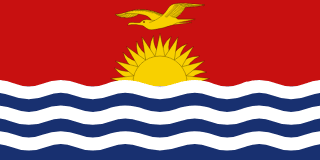Kiribati - Government

Based on the etymolgy of Kiribati, it was the name is the local pronunciation of "Gilbert," the former designation of the islands; originally named after explorer Thomas GILBERT, who mapped many of the islands in 1788. The Government system in this country is the presidential republic type and the different Administrative divisions includes: 3 geographical units: Gilbert Islands, Line Islands, Phoenix Islands; there are no first-order administrative divisions, but the 6 districts are Banaba, Central Gilberts, Line Islands, Northern Gilberts, Southern Gilberts, Tarawa, with 21 island councils on Abaiang, Abemama, Aranuka, Arorae, Banaba, Beru, Butaritari, Kanton, Kiritimati, Kuria, Maiana, Makin, Marakei, Nikunau, Nonouti, Onotoa, Tabiteuea, Tabuaeran, Tamana, Tarawa, Teraina
National symbols
Frigatebird.
The flag
The National flag of Kiribati has .
Info
The National Anthem
| Title | |
|---|---|
| Lyric/music |
Info
More about the government of Kiribati
| Date of Independence | 12 July 1979 (from the UK) |
|---|---|
| National holiday | Independence Day, 12 July (1979) |
| Legal system | English common law supplemented by customary law |
| International law organization participation | has not submitted an ICJ jurisdiction declaration; non-party state to the ICCt |
| Constitution | |
| History | The Gilbert and Ellice Islands Order in Council 1915, The Gilbert Islands Order in Council 1975 (pre-independence); latest promulgated 12 July 1979 (at independence) |
| Amendment process | Proposed by the House of Assembly; passage requires two-thirds majority vote by the Assembly membership; passage of amendments affecting the constitutional section on amendment procedures and parts of the constitutional chapter on citizenship requires deferral of the proposal to the next Assembly meeting where approval is required by at least two-thirds majority vote of the Assembly membership and support of the nominated or elected Banaban member of the Assembly; amendments affecting the protection of fundamental rights and freedoms also requires approval by at least two-thirds majority in a referendum |
| Citizenship | |
| Citizenship by birth | no |
| Citizenship by descent only | at least one parent must be a native-born citizen of Kiribati |
| Dual citizenship recognized | no |
| Residency requirement for naturalization | 7 years |
| Executive Branch | |
| Chief of state | President Taneti MAAMAU (since 11 March 2016) |
| Head of government | President Taneti MAAMAU (since 11 March 2016) |
| Cabinet | Cabinet appointed by the president from among House of Assembly members |
| Election/appointment process | president directly elected for a 4-year term (eligible for 2 additional terms) by simple-majority popular vote, after candidates are nominated from among House of Assembly members; vice president appointed by the president |
| Most recent election date | 25 October 2024 |
| Election results | 2024: Taneti MAAMAU reelected president; percent of vote - Taneti MAAMAU (TKP) 55%, Kaotitaake KOKORIA (independent) 42%, Bautaake BEIA (TKP) 3% 2020: Taneti MAAMAU reelected president; percent of vote - Taneti MAAMAU (TKP) 59.3%, Banuera BERINA (BKM) 40.7% |
| Expected date of next election | 2028 |
| Legislative branch | |
| Legislature name | House of Assembly (Maneaba Ni Maungatabu) |
| Legislative structure | Unicameral |
| Number of seats | 45 (44 directly elected; 1 appointed) |
| Electoral system | Plurality/majority |
| Scope of elections | Full renewal |
| Term in office | 4 years |
| Most recent election date | 8/14/2024 to 8/19/2024 |
| Percentage of women in chamber | 11.1% |
| Expected date of next election | August 2028 |
| Judicial branch | |
| Highest court(s) | High Court (consists of a chief justice and other judges as prescribed by the president) |
| Judge selection and term of office | Chief justice appointed by the president on the advice of the cabinet in consultation with the Public Service Commission (PSC); other judges appointed by the president on the advice of the chief justice along with the PSC |
| Subordinate courts | Court of Appeal; magistrates' courts |
| Diplomatic representation in the US | |
| Chief of mission | Ambassador Teburoro TITO (since 24 January 2018); note - also Permanent Representative to the UN |
| Chancery | 685 Third Avenue, Suite 1109, New York, NY 10017 |
| Telephone | [1] (212) 867-3310 |
| FAX | [1] (212) 867-3320 |
| Email address and website | [email protected] |
| Diplomatic representation from the US | |
| Chief of mission | Ambassador Marie DAMOUR (since 6 December 2022); note - Ambassador DAMOUR is based in the US Embassy in the Republic of Fiji and is accredited to Kiribati as well as Nauru, Tonga, and Tuvalu |
| National heritage | |
| Total World Heritage Sites | 1 (natural) |
| Selected World Heritage Site locales | Phoenix Islands Protected Area |
Key Political parties and their leaders in Kiribati
Info
International organization participation
All Important Facts about Kiribati
Want to know more about Kiribati? Check all different factbooks for Kiribati below.









